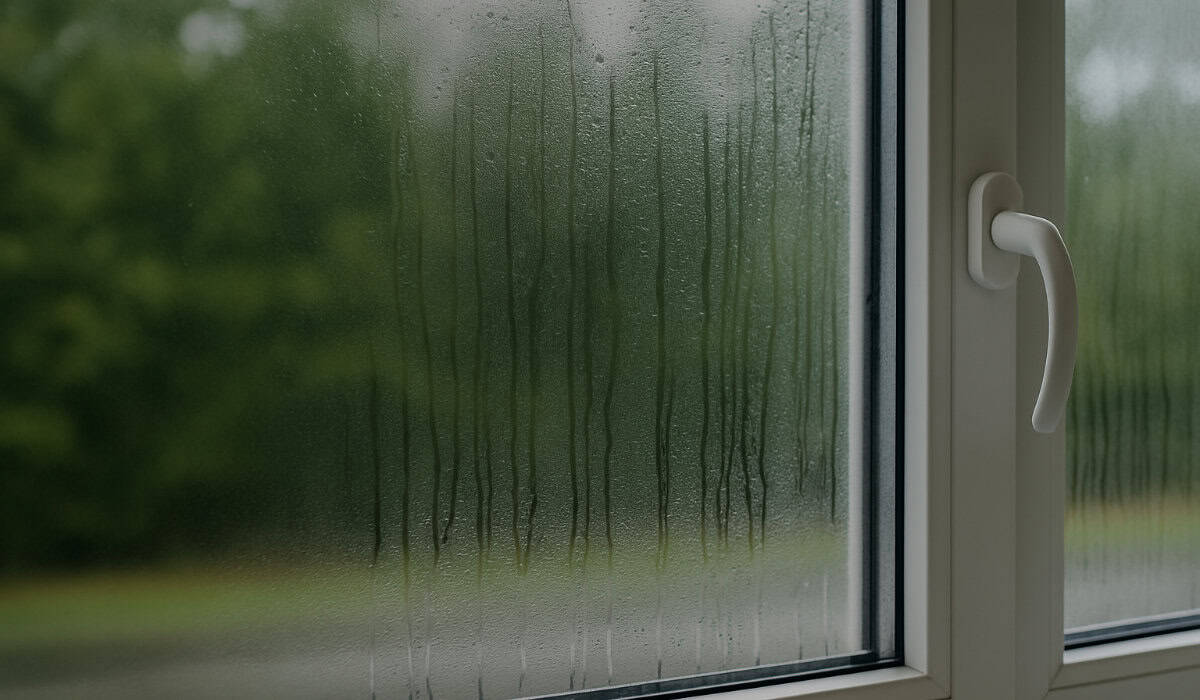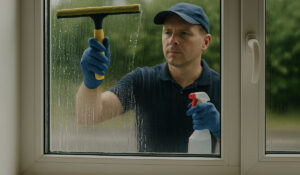Florida is a wonderful state thanks to its tropical climate, beaches, and relaxed lifestyle. However, that same humid environment we love also poses a constant risk to our buildings. One of the most affected elements are windows, which are directly exposed to rain, constant moisture, temperature changes, and coastal salinity.
Many property owners underestimate the impact of weather on their windows and enclosures. Over time, deteriorated windows can become a source of leaks, mold, bacteria, and structural problems. This article explores in depth how humidity affects your windows and what steps you can take to protect them effectively.
Florida’s humid climate: a silent threat to your windows

Florida averages a relative humidity of 75% throughout most of the year. This constant humidity creates a perfect environment for microorganisms and material deterioration through water absorption.
Windows, especially those in direct contact with the outdoors, begin absorbing moisture that seeps through frames, seals, and microcracks. Over time, this compromises the window’s structure, reduces its functionality, and impacts the general aesthetic of the facade.
❄️ Additionally, the mix of humidity and temperature changes generates internal condensation, which can lead to oxidation, staining, or warping. If you live near the coast, salt exposure worsens the issue.
Stains, mold, and rust: signs your window is in trouble
The first visible sign of moisture damage in windows is usually the appearance of dark or greenish stains on frames and corners. This points to mold or algae growth.
In metal materials, rust shows up as orange patches, indicating advanced corrosion. This kind of damage threatens the safety and longevity of the structure.
Mold not only looks bad—it’s a serious health hazard. If you notice musty smells or recurring stains despite cleaning, it’s likely due to constant humidity damage.
Which types of windows are most vulnerable to humidity?
Not all windows perform equally in humid climates. Wooden windows, for example, are especially sensitive—they absorb moisture, swell, warp, and foster mold growth if not maintained regularly.
Aluminum windows are more resistant but can corrode over time if unprotected or exposed at the edges. PVC windows perform well but still require proper sealing and care.
Double-pane or sealed thermal windows offer excellent insulation, but if the seal fails, moisture can seep between panels, causing permanent fogging or stains.
How humidity damages seals and reduces energy efficiency
Window seals play a critical role: they block air and water infiltration from the outside. However, excessive humidity degrades rubbers, silicones, and foams over time.
When this happens, thermal insulation is lost. Your HVAC system must work harder to maintain indoor temperature, increasing energy consumption and utility bills.
⚡️ Furthermore, water leaks can cause interior wall stains, damage nearby furniture, or even create short circuits if moisture reaches electrical installations.
Dirty windows = bacteria and mold: a health hazard at home
Windows should be functional and aesthetic, but they also impact home health. When moisture combines with dirt, it creates the perfect environment for bacteria, mold spores, and fungi.
This particularly affects children, people with allergies, and the elderly, who may suffer from respiratory issues, congestion, eye irritation, or persistent fatigue.
🧠 A seemingly “just stained” window can actually be a constant source of invisible contaminants affecting your indoor air quality.
Ideal cleaning frequency for windows in humid areas
In areas like Florida, window cleaning should be more frequent than in other regions. Professional cleaning is recommended monthly or every two months, depending on proximity to the coast or high-traffic areas.
Basic surface cleaning isn’t enough. It’s necessary to remove residue, salt, mold, and inspect seals and frames.
Establishing a routine with professionals not only improves your property’s appearance—it also extends window life and prevents bigger risks.
DIY cleaning or professional help? What to know in a humid climate
DIY cleaning can help maintain basics but doesn’t replace professional service, especially in humid climates where damage can be microscopic or in hard-to-reach areas.
A professional service like Sapphire Window Cleaning uses specialized techniques, suitable products, and tools that won’t harm the materials. They also inspect the general condition of the structure.
📆 Investing in recurring professional cleaning is a smart decision to prevent damage, save money, and avoid major issues long term.
When should you call a professional?
There are clear signs you need professional help: persistent mold, foggy windows between panes, broken seals, water leaks, or difficulty opening/closing frames.
It’s also advisable to schedule inspections after strong storms, hurricanes, or if you live near the coast where salt accelerates wear.
A professional doesn’t just clean—they can detect structural problems, offer preventive maintenance, and recommend customized solutions.
In Florida, a humid climate is a part of daily life, but that doesn’t mean you have to accept its damage. Windows are a vital part of any property, and taking care of them protects your investment, health, and image.
Understanding how humidity affects your windows and acting accordingly can make the difference between a neglected facade and a flawless property.
Never underestimate the power of clean windows—they improve appearance, prevent structural damage, and provide well-being. Act today and give your windows the care they need.
At Sapphire Window Cleaning, we take pride in being your trusted, specialized provider for window cleaning and maintenance in mid- and high-rise buildings.
Our commitment to excellence, combined with innovative techniques and state-of-the-art equipment, ensures your property receives the care it deserves—maintaining its impeccable appearance and extending the lifespan of your installations.
Ready to improve your property’s look and durability? We invite you to learn more about our services by visiting our website or contacting us through this link.
At Sapphire Window Cleaning, we are dedicated to providing exceptional quality and professional attention that exceeds expectations.
Disclaimer: “Before making decisions that could affect the safety or performance of your property, it is always advisable to seek professional guidance.”
✅ 15 Frequently Asked Questions (FAQs)
How does humidity affect your windows in Florida?
Constant humidity in Florida deteriorates seals, promotes mold and rust, and reduces thermal efficiency—especially in coastal areas.What kind of damage does humidity cause to wooden windows?
Wood absorbs moisture easily, leading to swelling, warping, mold growth, and compromised structural sealing.Is rust on window frames caused by humidity?
Yes. Humidity combined with salt exposure accelerates corrosion in aluminum or iron frames, weakening their structure.Why is regular window cleaning important in humid climates?
Because dirt and humidity create the perfect environment for bacteria, fungi, and mold—affecting both health and property appearance.How often should I clean my windows if I live in Florida?
At least every 30 to 60 days, especially if you’re near the ocean or in high-traffic zones.What health problems can dirty windows cause?
Dirty windows with trapped humidity can lead to allergies, respiratory problems, congestion, and general discomfort.Which window materials are more resistant to humidity?
PVC and treated aluminum are more resistant, but regular maintenance is still required to protect seals and frames.Can humidity damage be prevented in windows?
Yes. With regular professional cleaning, seal inspections, and proper treatment of materials, damage can be minimized.What are signs that humidity has already damaged my windows?
Visible mold, stains, broken seals, condensation between panes, and difficulty opening or closing are warning signs.How does humidity reduce a window’s energy efficiency?
Broken seals allow air and moisture in, forcing HVAC systems to work harder, which increases energy use and costs.Does professional cleaning eliminate mold and bacteria from windows?
Yes. Professionals use safe disinfectant products that eliminate harmful agents without damaging the surface.Is DIY window cleaning enough in humid climates?
Not entirely. DIY helps maintain appearance, but doesn’t detect hidden damage like professionals do.What happens if I ignore signs of moisture damage?
The damage may spread to walls, furniture, or even electrical systems—resulting in higher repair costs.What tools do professionals use to handle moisture-damaged windows?
They use purified water systems, telescopic brushes, antibacterial agents, and safe techniques with no residue.When should I contact Sapphire Window Cleaning?
When you see persistent mold, stains, condensation, leaks, or just want to prevent future damage—especially after storms.




